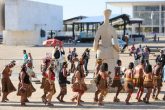Newsletter 908: The Estreito Hydroelectric: small example of what Belo Monte would be
"These companies are criminal and all that is done to you there in
A public hearing on Wednesday April 7, at the House of Representatives in
The name of the hearing: "Environmental and Economic Impacts of the Implantation of Hydroelectric plants of Estreito and Belo Monte”
Residents affected by the Estreito hydroelectric in the state of
Expulsion
In her speech, the Assistant Attorney General, Sandra Cureau, emphasized that the construction of Estreito represents the expulsion of riverine peoples and destruction of their life projects. "Thus, they will swell the vast migratory contingent of the large cities ending up in favelas. The negotiation that are held with the riverine peoples is very unequal”, she said. According to the Assistant Attorney General, many workers who live on the river are neither considered affected nor their activities recognized and they suffer without their means of livelihood, among them: fishermen, settlers and sharecroppers, boatmen, rubber workers, extractivists, ceramicists.
Regarding Belo Monte, Sandra presented a small retrospective of the years in which the MPF filed actions in opposition to Belo Monte and also reminded that this Thursday (8), the MPF would again file actions for annulment of the license of Belo Monte.
Above the law
"It appears that companies are above the State! It is a public work, on a public river, where a private company will make money and local families only lose”, exclaimed Cirineu da Rocha, coordinator of the Movement of People Affected by Dams (MAB). "I beg that the operating license not be released for Estreito, because it will be a disaster for us all”.
Families in the region of Estreito have been camped in the area to be flooded for more than nine months, functioning as human shields. Rocha stated that the Consórcio Estreito Energia (CESTE) does not follow any guideline that has been established. “It seems that companies are above the State!”
Humiliation and lies
The representative of the Forum of People Affected by the Estreito Dam, Adalsivan Coelho, echoed the MAB leadership. "We have spent ten years trying to get to a public space to denounce what is happening! We are humiliated, we have no right to speak, and all the promises made to us are lies!" said the leader. According to Adalsivan, the CESTE flees from "round tables", sends libelous reports to the government and massacres communities. "We need you gentlemen! Our cry is muzzled by power and by money!", he emphasized. Adalsivan cited, among other cases of disrespect, the fact that CESTE is paying those impacted a value well below what the land is worth so that they leave the area.
Scope of destruction
The hearing was also presented with a report from the Brazilian Platform on Human, Economic, Social, Cultural and Environmental Rights (Plataforma Dhesca). Called "Xingu Mission – Human Rights Violations in Licensing of the Belo Monte Hydropower Plant", the document was presented by one of its rapporteurs, Dr. Jose Guilherme de Carvalho Zagallo. In his speech, Zagallo demonstrated the scope of destruction were Belo Monte to be built, stating that the consequences will be even greater than in relation to the Estreito plant because Belo Monte would be the third largest hydroelectric dam in the world.
Human Rights violations
The report presents the various failures of the Belo Monte project and the irreversible impacts on the population living on the banks of the
Mirror of the future
For Antônia Melo, leader of the Movement Xingu Forever Alive, present at the hearing, the Estreito situation is a mirror. "We monitor the Estreito struggle. It is lamentable that they have been encamped for such a long time. Your situation serves as a mirror for us and that means we are treated as trash”, she said. "These companies are criminal and all that is done to you there in
The hearing also had the participation of representative Chico Alencar, of the Psol, Senator José Nery, also of Psol, Iriny Lopes, of the PT, representative Domingos Dutra, of the PT (who proposed the hearing), representative Pedro Wilson of the PT, among others. The five representatives of the ministries invited to participate in the hearing did not attend.
***
Circa 30 thousand people would be "booted" by Belo Monte
"It is undisputed that
The Indigenous Missionary Council (CIMI), together with the Commission for the Amazon and the Brazilian Commission for Justice and Peace (CBJP), supported by the National Conference of Bishops of Brazil (CNBB) held Thursday morning April
Composing the panel, president of CIMI and bishop of the Xingu Prelature, Dom Erwin Kräutler; researcher in Electrotechnics and Energy at University of São Paulo (USP), Francisco Hernandez; the director of Licensing IBAMA, Pedro Alberto Bignelli; and the chairman of the Energy Research Company (EPE), Maurício Tolmasquim. The debate was mediated by journalist Beto Almeida and broadcast live on Life Network Television.
Underestimated impacts
In his talk, bishop Erwin provided an historical reprise of the struggle against Belo Monte and once again reaffirmed his position in opposition to the project. For him the question does not refer to the right of the population to have access to energy of quality, but the means employed to ensure that right. "It is undisputed that
Also according to Dom Erwin there is no way to discuss the project without talking about the impacts it would cause. The enterprise will affect at least 30 indigenous groups and its impacts have been under-dimensioned by the Federal Government, such as the area affected, population impacted, loss of biodiversity, the compulsory dislocation of rural and urban populations, among other aspects.
“I am opposed to the way it was done, with authoritarianism and advocating the development discourse of the government, which speaks only off advantages and never about the disadvantages that Belo Monte would bring. About 30 thousand people will be booted out of there and taken who knows where. This work will be the greatest aggression ever seen on the Amazon”, he said.
Itaipu
Giving voice to the development discourse of the government, as pointed out by Dom Erwin, president of EPE, Mauricio Tolmasquim said it is impossible to imagine a society without energy, which is a sign of development. He said the Belo Monte hydroelectric will be the only one built along the
At minimum this is an contradiction, in that Tolmasquim himself declared that in order to meet the growing energy demand of the population, the nation would have to build a hydroelectric plant with the potential of the Itaipu power plant every three years, each one generating circa 5 megawatts per year.
Pedro Alberto Bignelli, director of licensing of the Environmental Agency Ibama, based his argument on the fact that bodies such as the Chico Mendes Institute, the Institute of Historical and Artistic Heritage (Iphan), the Palmares Foundation and even the National Foundation for Indigenous Affairs (Funai) have favored licensing, and consequently the work. For him, all the effects noted in studies on the feasibility of the work would be contemplated by the 40 conditions itemized in the provisional license issued in February.
Unviable
For Francisco Hernandez, researcher at USP, the issue is quite controversial, because the plant, supposedly the third largest in the world – second only to Three Gorges in
According to Hernandez, the work is of a catastrophic dimension so great that it must be rethought, taking into account not only the areas inundated, but the entire population that will be impacted. "As an electrical engineer I recognize the importance of energy generation, but I am opposed to the plant because I know the disastrous consequences it would bring," he said.






